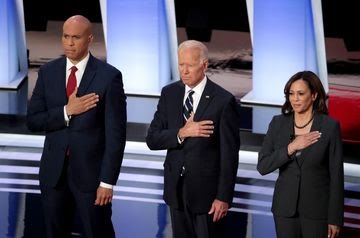
In their first four debates, the Democratic presidential candidates did not have much to say about the overall health of the economy — and what little they did have to say was out of step with the public.
They’re at the mercy, to some extent, of the questions the moderators ask. They’re also differentiating themselves from one another, and talking about issues like health care and criminal justice — where their records and positions differ in ways that matter to Democratic voters — is more useful for that purpose than talking about jobs and wages.
But there’s another reason the Democratic candidates aren’t steering the conversation to those bread-and-butter topics. Today’s economy creates a political challenge they have not figured out how to meet.
There was, by contrast, a natural message for their party’s presidential candidates in the elections from 1992 through 2016. In 1992, 2004 and especially 2008, they were able to run against Republicans’ stewardship of the economy. In the first two cases the economy had emerged from recessions but it didn’t feel that way to a lot of voters; in the third the economy seemed to be melting down. In 1996, 2000, 2012 and 2016,(1) they could run on continuing the economic expansions that Democratic presidents had overseen.
At the moment, Democrats are faced with a problem they have not faced since 1988: running to take the White House from the Republicans at a time when the economy has clearly been growing. It is true that the economy hasn’t hit the marks that Donald Trump and his advisers promised, such as a 3% annual growth rate. It is true, as well, that there are some signs of economic weakness.
Yet the Labor Department’s jobs report on Friday showed that unemployment has fallen to levels not seen in half a century and wages are growing. Inflation remains subdued. Since 2001, Gallup has been asking Americans if they think it’s “a good time to find a quality job.” In May, a record 71% said yes.
(snip)
This line of attack fails on two counts. First, the unemployment rate is a better indicator of the strength of the economy than how many Americans work multiple jobs. Second, today only 5.2% of employed Americans work more than one job, a proportion that has slightly fallen since the boom economy of the late 1990s.
In Wednesday’s debate, Julián Castro, the former secretary of Housing and Urban Development, tried a different tack, moving from saying that the economy is not so great in one breath to crediting Barack Obama for its strength in the next. Bernie Sanders hit on his theme of “the massive level of income and wealth inequality in America” – which is the top issue for all of 2% of Americans.
You can see why Joe Biden called health care, and not jobs or wages, “the single most important issue facing the public.” The big-picture economic outcomes under Trump are hard to argue with. And incumbent presidents get credit or blame for those results whether or not they caused them. Trump’s job approval rating, for obvious reasons, is lower than presidents with this kind of economic performance usually enjoy. But his rating on the economy is stronger than his overall rating.
For Democratic presidential candidates, then, the best strategy on the economy is twofold: Switch the subject, and hope for a recession.
(1) The situation in 2016 was a little more complicated than in the other expansion years: Perceptions of the economy had dropped, as had economic growth, and Hillary Clinton never quite decided whether to run on Obama’s accomplishments or proclaim the economic policies of the previous decades a failure.
*story by Bloomberg